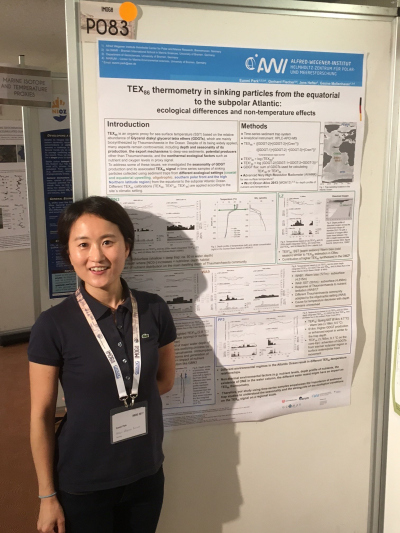Eunmi Park
Report of GLOMAR PhD student Eunmi Park about her participation in International Meeting on Organic Biochemistry 2017 in Florence, Italy from 17 to 22 September 2017
I attended the International meeting on organic geochemistry (IMOG), which was held on 17-22 September, 2017 at Palazzo dei Congressi, Florence, Italy. The conference covered the most advance organic geochemistry, including “planetary, marine and lacustrine proxies, Cenozoic climate, petroleum systems, Paleo-tracers, environmental geochemistry, microbial biogeochemistry, novel methods, and so on”, and more than 430 scientists shared their ongoing researches from around the world. Beside the scientific events, there were always great opportunities to get to know scientists and experts from academia, industry, and government in the field of organic geochemistry during the icebreaker reception, coffee breaks, lunches, cultural event and conference dinner.
The conference started with the icebreaker reception in the garden at the conference site on 17 September, and it gave me a good opportunity to introduce myself and invite them to my poster later at a relaxed and friendly atmosphere. Although the IMOG is relatively bigger than the other international organic geochemistry conference like the Gordon research conference and seminar (130-150 participants), it was easy to get in contact with people who specialize in the same or related fields because of the well-organized parallel sessions and poster presentation. There was only one session in the morning for all attendants, and only two sessions were running in parallel after the poster presentation in the afternoon. Even for participants who wanted to join the other session, it was easy to move to the other room between talks.
I presented my PhD project during the poster session entitled “TEX86 thermometry in sinking particles from the equatorial to the subpolar Atlantic: ecological differences and non-temperature effects” for one and half hour from Monday to Thursday. During the poster session, I had an opportunity to talk with the pioneers who I cited on my manuscripts. They gave me a different prospective as microbiologists and oceanographers, which were very helpful to have new points of view on my data. Next to a lot of interesting talks and posters, I could talk to PhD students and postdocs I already met at the molecular organic biogeochemistry course in Texel, 2015 and the Gordon research conference in New Hampshire, 2016, and share our progress of PhD researches as well as the career status after the PhD. This made me consider my future career in more details.
All in all, I would like to thank GLOMAR for the opportunity by providing funding support to join this conference, and I encourage especially for PhD candidates to attend this conference to share their research with other scientists in the field of organic geochemistry and grab networking opportunities.



